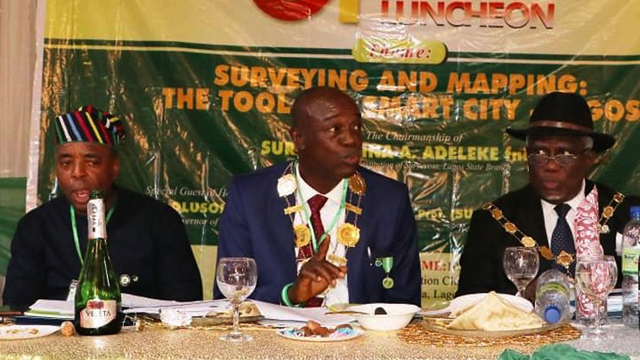Experts in the built environment have stressed the critical role of surveyors in providing accurate geospatial data for smart cities.
According to them, the ability of surveyors to perform advanced measurements and establish positional location information is critical in providing the base data necessary for smart city services.
They spoke at the 34th Annual General Meeting and Luncheon of Nigerian Institution of Surveyors (NIS) Lagos State branch, themed: “Surveying and Mapping: The Tool For Smart City, Lagos”.
Leading discussions on the theme, the Rector, Federal School of Surveying, Oyo, Dr. Nihinlola, Olayinka, stressed that smart cities are based on the fundamental framework of digital cities:
“An urban spatial data infrastructure is the fundamental framework of digital cities. Based on that framework, all kinds of information in a digital city can be modelled and indexed; and together with the internal association and relations of natural, human, and societal information, it forms the basis of a smart city”, she noted
Dr Olayinka stressed that surveyors have a big role in the development, installation, and maintenance of these cities, because of the critical role of surveying and mapping in any meaningful development including the smart city.
She noted the advancement in the power of computing and miniaturization of circuit and processors leading to the creation of the smart items thereby making tasks and processes easier than ever.
The smart approach to tasks and processes with the miniaturization of measuring devices, she said, had also made surveying and mapping easier than ever before, thereby making surveyors to now work smarter rather than harder as it used to be.
Highlighting the integral role of surveying in the process of site development from planning through construction, professional surveyors, she said technology will continue to push the limits of computing speed, physical size and data capacity looking for the “next big thing, while the surveying profession continue to enjoy many of the fruits of that success.
According to her, smart cities will continue to evolve as people migrate to urban areas and forcing the existing infrastructure to expand or face failure.
“Surveyors will continue to help provide a variety of services to those citizens and municipalities, with an eye on the future for more advancing technology”, she said.
She stressed the need for surveyors to step up their games through continuous professional development (CPD) .
Dr Olayinka called for a good inter-relationship and collaboration between surveyors, the government of Lagos state and other allied professionals since the boundary of professions had collapsed.
In his remarks, Lagos State Governor, Babajide Sanwo Olu, stressed the importance of digital technology in the sound administration of Lagos with over 22 million inhabitants.
The governor, represented by the State’ s Surveyor-General, Olutomi Sangowawa stressed that the state’ s Geographic Information System (GIS) will be operational in March 2020, while the five Continuously Operating Reference Station (CORS) stations will be deployed for data collections.
According to him, the COR stations are in the final stage of user assessment and will come alive next month.
Moreover, Governor Sanwo Olu disclosed that the state had been granted license by the Nigeria Communication Commission (NCC) to operate the Unmanned Aerial Vehicles (UAVs), making the state the only one in Nigeria granted such licence.
With this technology, there will stream of data for everyone in the state, while there will be a significant improvement in mappings accuracy.
Another strategy towards the smart city move, the Governor said is the installation of special data infrastructure, which will put all information into a three-D environment for use of surveyors and allied professionals.
All these, he said, will help in attaining the 30 days concept, meaning that submissions will be automated and copies of surveys can be submitted within a week.
In his remarks, the Branch Chairman, Adesina Adeleke, noted the huge burden of the Lagos’ population of about 28 – 25 million inhabitants, on social amenities.
He extolled the state for the Lagos GIS, which he said provides an innovative way of tackling the enormous pressure on social amenities in the state.
Source: Guardianng




